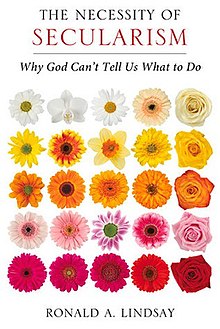The Necessity of Secularism: Why God Can’t Tell Us What to Do

The Necessity of Secularism: Why God Can't Tell Us What to Do
|
|
| Author | Ronald A. Lindsay |
|---|---|
| Language | English |
| Subject | Secularism |
| Publisher | Pitchstone Publishing |
|
Publication date
|
2014 |
| Media type | Paperback |
| Pages | 224 |
| ISBN | |
The Necessity of Secularism (subtitled Why God Can't Tell Us What to Do) is a book by Center for Inquiry CEO Ron Lindsay arguing that secularism in government is the best solution to the problems posed by a society with differing and incompatible perspectives on religion, and that for democratic discourse to be successful, religious doctrines need to be kept out of public policy discussions.
Lindsay's two primary themes in The Necessity of Secularism are the importance of secular government in a religiously pluralistic society and the independence of morality from theistic or religious belief. In support of the first theme, Lindsay argues that with different religious sects competing for membership and space in a democratic society, a common language is needed. In addition to formal separation of church and state, Lindsay urges that discussions of public policy be free from religious language and doctrine. Since religious language is only meaningful to practitioners of the religion that employs it, it's necessary to translate it to secular language in public policy discussions in a pluralistic society. Lindsay rejects arguments from authors such as Stephen Carter and Noah Feldman that such a requirement is too much of a burden to religious believers: "Most believers, like everyone else, live day-to-day in a secular world, a world in which we have no trouble communicating about natural phenomena...You don't need a Bible to conclude that if all humans are mortal, and Socrates is human, then Socrates is mortal. So secular language is spoken by believers already; they just have to apply it to public policy issues." In support of the second major theme of his book, the independence of morality from theistic or religious belief, Lindsay emphasizes the Euthyphro dilemma. He considers several religious responses to the dilemma, and concludes that none of them succeed. Further, Lindsay talks about the epistemological problems in claiming that a doctrine is based on divine revelation, as there is no independent way to verify that such a revelation has occurred. It is from this point that the reason in the eponymous sub-title of the book is given: "God cannot tell us what to do because, among other reasons, we are not able to recognize a command from God. Because God cannot effectively communicate with us, we cannot base morality on his commands."
...
Wikipedia
